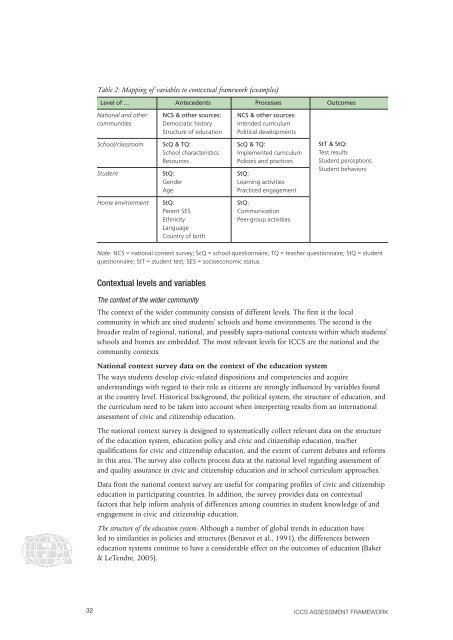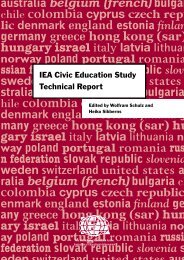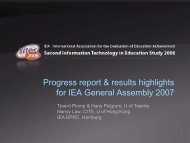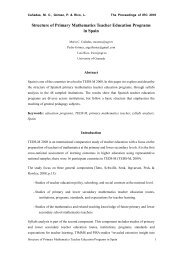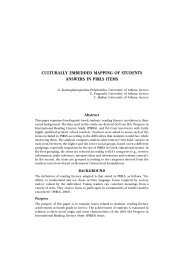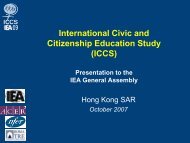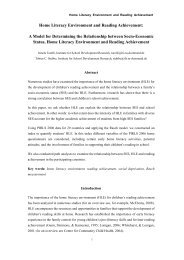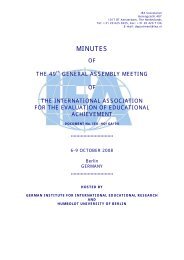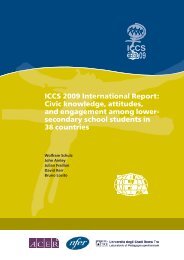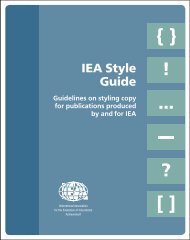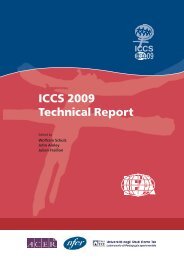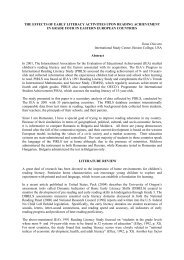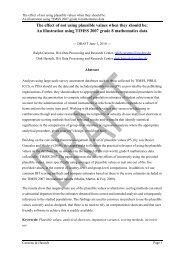International civic and citizenship education study - iccs - IEA
International civic and citizenship education study - iccs - IEA
International civic and citizenship education study - iccs - IEA
- TAGS
- civic
- citizenship
- iccs
- www.iea.nl
You also want an ePaper? Increase the reach of your titles
YUMPU automatically turns print PDFs into web optimized ePapers that Google loves.
Table 2: Mapping of variables to contextual framework (examples)<br />
Level of ... Antecedents Processes Outcomes<br />
National <strong>and</strong> other NCS & other sources: NCS & other sources:<br />
communities Democratic history Intended curriculum<br />
Structure of <strong>education</strong> Political developments<br />
School/classroom ScQ & TQ: ScQ & TQ:<br />
School characteristics Implemented curriculum<br />
Resources Policies <strong>and</strong> practices<br />
Student StQ: StQ:<br />
Gender Learning activities<br />
Age Practiced engagement<br />
Home environment StQ: StQ:<br />
Parent SES Communication<br />
Ethnicity Peer-group activities<br />
Language<br />
Country of birth<br />
Note: NCS = national context survey; ScQ = school questionnaire; TQ = teacher questionnaire; StQ = student<br />
questionnaire; StT = student test; SES = socioeconomic status.<br />
Contextual levels <strong>and</strong> variables<br />
StT & StQ:<br />
Test results<br />
Student perceptions<br />
Student behaviors<br />
The context of the wider community<br />
The context of the wider community consists of different levels. The first is the local<br />
community in which are sited students’ schools <strong>and</strong> home environments. The second is the<br />
broader realm of regional, national, <strong>and</strong> possibly supra-national contexts within which students’<br />
schools <strong>and</strong> homes are embedded. The most relevant levels for ICCS are the national <strong>and</strong> the<br />
community contexts.<br />
National context survey data on the context of the <strong>education</strong> system<br />
The ways students develop <strong>civic</strong>-related dispositions <strong>and</strong> competencies <strong>and</strong> acquire<br />
underst<strong>and</strong>ings with regard to their role as citizens are strongly influenced by variables found<br />
at the country level. Historical background, the political system, the structure of <strong>education</strong>, <strong>and</strong><br />
the curriculum need to be taken into account when interpreting results from an international<br />
assessment of <strong>civic</strong> <strong>and</strong> <strong>citizenship</strong> <strong>education</strong>.<br />
The national context survey is designed to systematically collect relevant data on the structure<br />
of the <strong>education</strong> system, <strong>education</strong> policy <strong>and</strong> <strong>civic</strong> <strong>and</strong> <strong>citizenship</strong> <strong>education</strong>, teacher<br />
qualifications for <strong>civic</strong> <strong>and</strong> <strong>citizenship</strong> <strong>education</strong>, <strong>and</strong> the extent of current debates <strong>and</strong> reforms<br />
in this area. The survey also collects process data at the national level regarding assessment of<br />
<strong>and</strong> quality assurance in <strong>civic</strong> <strong>and</strong> <strong>citizenship</strong> <strong>education</strong> <strong>and</strong> in school curriculum approaches.<br />
Data from the national context survey are useful for comparing profiles of <strong>civic</strong> <strong>and</strong> <strong>citizenship</strong><br />
<strong>education</strong> in participating countries. In addition, the survey provides data on contextual<br />
factors that help inform analysis of differences among countries in student knowledge of <strong>and</strong><br />
engagement in <strong>civic</strong> <strong>and</strong> <strong>citizenship</strong> <strong>education</strong>.<br />
The structure of the <strong>education</strong> system: Although a number of global trends in <strong>education</strong> have<br />
led to similarities in policies <strong>and</strong> structures (Benavot et al., 1991), the differences between<br />
<strong>education</strong> systems continue to have a considerable effect on the outcomes of <strong>education</strong> (Baker<br />
& LeTendre, 2005).<br />
32 ICCS ASSeSSment FrAmework


